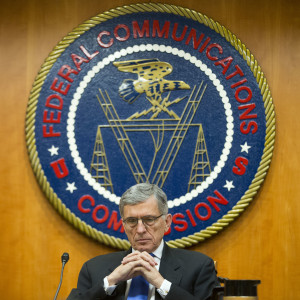The Federal Communications Commission expanded the wireless alerts that automatically go out to mobile phones during natural disasters, terror attacks, kidnappings and other emergency situations during its open meeting Thursday, where it dropped at the last minute a proposal to let cable subscribers get rid of their set-top boxes.
All three Democratic commissioners and one Republican voted to update to the Wireless Emergency Alert (WEA) system, compelling wireless carriers to expand the character limit of alerts from 90 to 360, support additional multimedia like embedded phone numbers, photos of victims in AMBER alerts and web links to more information on all 4G LTE and newer networks.
“A picture could save a thousand lives if the right person sees it,” Commissioner Jessica Rosenworcel said.
The update comes two weeks after alerts over bombings in New York City and New Jersey went out to New Yorkers outside of affected areas in the neighborhood of Chelsea, alerting residents beyond to shelter in place. Residents also complained the brief, ambiguous wording of the short message heightened panic in the search Ahmad Khan Rahami, who was later apprehended in connection with the bombing.
One commissioner said the recent flooding in Louisiana that led to the rescue of more than 30,000 people exposed the necessity of updating the geographic targeting of alerts.
“The alerts went un-heeded by tens of thousands of people,” Commissioner Ajit Pai said. “Residents ignored the messages because they had previously received flood alerts that only applied to homes located within a traditional flood zone. According to CSRIC [Communications Security, Reliability and Interoperability Council], this time around people ‘assumed the alert was not for them since their home had never flooded before.'”
The problem of “over alerting” has led wireless subscribers and whole cities like Seattle to opt-out of using the system.
Carriers have one year to enact the changes, which include Spanish language support, narrower geographic targeting of alerts and greater ease for authorities to test the system.
Republican Commissioner Michael O’Rielly was the lone dissenting vote, citing concerns raised by smartphone manufacturers like Apple and wireless lobbying groups including CTIA, who say the update calls for capabilities networks don’t have, and could congest when too many users click on an emergency link, for example.
The agency advanced a proposal seeking comment on future updates including alert geo-fencing based on smartphone location data, additional language support, earthquake alerts in fewer than three seconds and improvements future network upgrades to 5G could potentially offer.
Thursday’s highest-profile open meeting vote on rules to compel cable and satellite providers to offer content on apps instead of making consumers rent set-top boxes was dropped shortly before commissioners convened.
“It’s time for consumers to say goodbye to costly set-top boxes. It’s time for more ways to watch and more lower-cost options. That’s why we have been working to update our policies under Section 629 of the Communications Act in order to foster a competitive market for these devices,” Democratic Commissioners Jessica Rosenworcel, Mignon Clyburn and Chairman Tom Wheeler said in a Thursday statement.
“We have made tremendous progress – and we share the goal of creating a more innovative and inexpensive market for these consumer devices,” they continued. “We are still working to resolve the remaining technical and legal issues and we are committed to unlocking the set-top box for consumers across this country.”
Rosenworcel during a congressional hearing two weeks ago expressed doubt about a provision in the proposal to give the FCC authority over licensing agreements between pay-TV providers and the third-party devices they would have to make their apps available on.
At the time, she doubted the FCC had the authority to oversee copyright, leading to the assumption by many Thursday she couldn’t be convinced to support the plan. With both Republicans having expressed their disapproval, Wheeler needs Rosenworcel’s vote to enact the order.
“The FCC made the right decision this morning to delay its vote on the set-top box item,” Comcast said in a statement Thursday. “Based on the limited information available from the chairman’s fact sheet and op-ed, a broad range of content creators, civil rights organizations, labor unions, and others have concluded that the chairman’s new approach does not solve the copyright, privacy, innovation and other significant concerns that were implicated in his discredited original proposal – and suffers from the same legal infirmities.”
During a press conference following the meeting, Wheeler said the decision to drop the plan from Thursday’s agenda was “simply a matter of running out of time.”
“We’re going back and forth on edits and content,” Wheeler said.
He said the agency is continuing to deliberate the rules, which remain in circulation.

